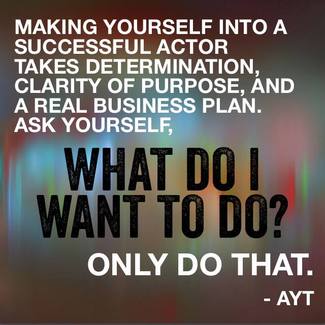|
Photo by Debra Lopez
|
 1. Did you know, careers are made by smart, discerning, actor-loving casting directors? There are casting directors who will redirect you in an audition to get your performance closer to what the director is looking for. Do you know that casting directors also work on a commission system? If they cast you in a play that runs a long time, they continue to get "residual checks" on the show? So it's in their best interest to cultivate, talented, supple actors who can take adjustments, adapt to the director's vision of the work or what the particular genre requires (i.e half hour, rom-com or procedural). Relationships with casting directors are everything. Join April for the How to Pilot Season Intensive and she'll teach you how to cultivate and sustain those relationships. Email [email protected] for details. 2. Tips for Pilot Season: 2. Research who you are auditioning for. This includes the Writers, Executive Producers, Casting and Network. Why? You do this research to get a sense of the writer/creator's style, pace, sense of humor. Shonda Rhimes and Michael Chriton both wrote hospital dramas, yet the pace, lighting, tone of the each are completely different and particular to the creator of each. So you have to learn their style to nail the gig. 3. Memorization seems to be one of the largest issues for new actors. How do you know where you fall in the spectrum? Well, if you're on camera trying to remember lines, we know you're a green actor. The character picks up your insecurity and magnifies it and huge pauses on camera = death to a performance. Actors often get script changes on set the morning of the shoot or even during the shoot. That's how fast lines need to be in your head. They need to be memorized by rote and you should be able to nail down 3-5 pages of text in an 30 mins. If you can't, you'd better hire a line reader or a coach. And if I hear one more actor going on about what they can't afford, I'll will turn into fairy dust. 4. Your competition, folks with MFA's have spent a minimum of $200,000 on their training, so they are miles ahead of you. You need to duplicate that amount of time in private coaching and classes. The advantage of private coaching is that you can tailor your own training regimen and meet with a coach 1:1 which is optimal and triples your learning curve. Besides, if you spend $300 in coaching to get one on camera gig, the gig will pay you anywhere from $1200-7000 depending on how much on camera time you have. So invest in yourself and strengthen your greatest resource: you. How well prepared you are is the only thing completely within your control and oddly enough, it's the most important.5. Hire a coach before every on camera audition, call back and screen test. There is almost zero rehearsal time in the world of film & tv, so your workout is your rehearsal. If your coach is a working professional, they can also provide valuable info about the lay out of the office, the folks you're auditioning for as well as how to approach the material. And even if you don't get this job, guess what? If you did solid work in the audition room, the director, casting director will remember you because they will have watched your tape. And the coaching will continue to hone your on camera skills.6. Make no mistake. Every reading or workshop of a play or screenplay is an audition. It is a chance to show folks your stuff. So if there's a song in the script, learn it ahead of time or ask for a recording of it. If a dialect or another language is required, learn it. Call a friend who's either speaks the language or knows someone who does and get a recording. I don't care if the script says, "Don't worry about it." Walking into a reading or audition fully prepared means you're serious about getting this job. This is the actor's job. I am amazed at how many actors don't bother. When given a chance to act, then act full out, no holds barred giving the total self....If you make yourself unforgettable in a one day reading, you have created an impression on the director, writer and producer or Artistic Director; not to mention all the other industry folks who will be in attendance. 7. Actor Tip: There's the job and then there's the audition. The job is on a set with real people and lots of cameras and you really get to be in the world of the film or TV show. In the audition room, it's an 8x10 tiny little room, with a casting director mumbling lines and giving you nothing. How do you create the reality of an entire world in a tiny little room, seated in a chair with a camera up your nose. It's a skill and it's not hard and it's not a trick, it's easy once u learn how to work the camera instead of the camera working you and your nerves... Come learn the secret! Want FREE Casting Notices, Audition Secrets, Business Tips, FREE classes, FREE conf calls , special Coaching/Class DISCOUNTS & inspirational quotes delivered straight to your inbox weekly? Sign up to receive THE ACTORS ARSENAL.
0 Comments
Your comment will be posted after it is approved.
Leave a Reply. |
Categories
All
|
 RSS Feed
RSS Feed